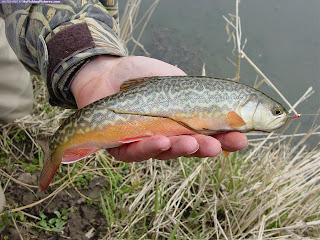Written by: Len Harris
Photos by: Len Harris
The tiger trout is a sterile hybrid cross between a female brown trout and a male brook trout. The fish exhibits unusual markings found in neither parent. Tiger trout are rare in the wild, appearing only in areas where brook and brown trout share spawning grounds. Stream born tigers take on the appearance of their fathers (brook trout) Hatchery tigers look more like their mothers (brown trout).
Wisconsin has NO stocking program and ALL tigers caught in Wisconsin streams are "Natural" tigers.
This interspecies cross is unusual, in part because each fish belongs to a separate genus (Salvelinus for brook trout and Salmo for browns). It happens rarely in the wild, but can be (and is) easily performed by fisheries biologists or hatchery technicians.
This wild (non-hatchery) tiger trout was caught in Southwestern Wisconsin by angler Kevin Searock. A typical tiger caught in the wild are 4 to 16 inches. *below*
Tigers are pretty fish. The normal vermiculations (wormlike markings) found on the backs of most brookies become enlarged and often contorted into stripes (hence the name 'tiger'), swirls, spots, and rings. The trout also exhibit a greenish cast, which lets you know, when you hook one, that there is something different on the end of your line long before the fish is in hand.
Naturally-occuring tiger trout generally appear only in streams that have higher brook trout than brown trout populations. And while they don't appear often, they are becoming more commonly found in the Midwest and New England.
http://lenharris.blogspot.com/2009/1...less-area.html







 Reply With Quote
Reply With Quote